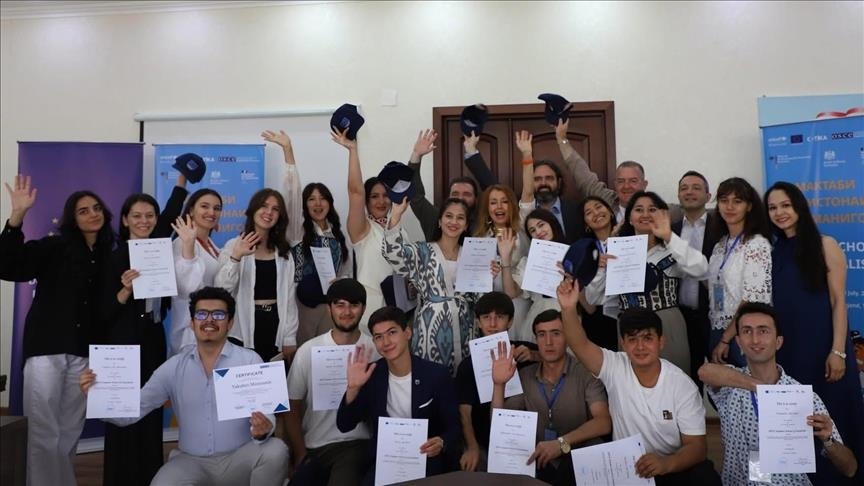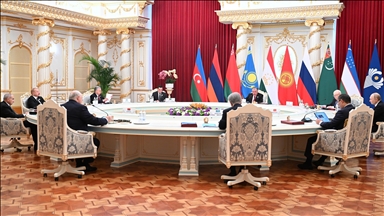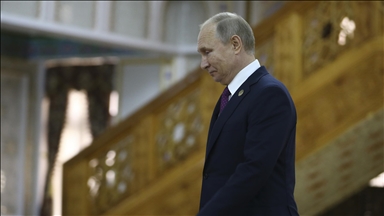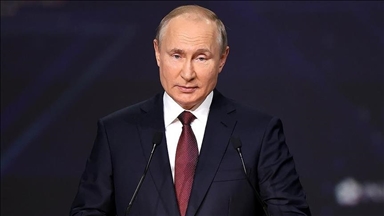Türkiye-backed summer program teaches young Tajiks ins and outs of journalism
Group of 20 students found chance to analyze journalism in terms of international standards, ethics, digital innovation, and its intersection with fields like economics, business, and environmental reporting

DUSHANBE, Tajikistan
A summer media school for young journalists in Tajikistan was concluded after three weeks of intensive training aimed at enhancing professional skills and fostering regional media cooperation.
Organized in partnership between the Turkish Cooperation and Coordination Agency (TIKA) and the Organization for Security and Co-operation in Europe (OSCE), the program brought together 20 participants from across Tajikistan in the city of Khujand. The initiative was also supported by UNICEF and the consulates of Germany, the United Kingdom, and France in the capital Dushanbe.
Participants received training on international journalism standards, media ethics, digital tools, and strategies to combat disinformation. Journalists from Türkiye’s Anadolu news agency contributed to the sessions, with senior correspondent Sibel Morrow covering economic journalism and interview techniques, and reporter Yeter Ada Seko leading training on climate and environmental reporting.
TIKA’s Coordinator in Dushanbe, Ibrahim Ethem Unal, said the primary goal was to strengthen the skills of young journalists while promoting responsible journalism and public awareness.
“By inviting Anadolu Agency journalists to Tajikistan, we aimed to enhance both knowledge-sharing and hands-on learning opportunities,” Unal said.
“We expect this program to help build strong and sustainable partnerships in media and communication between Türkiye and Tajikistan,” he added.
Unal underlined that TIKA’s involvement in media development would not be limited to one-off projects.
“We are approaching this field with a long-term vision,” he said. “New training programs, knowledge exchanges, or technical cooperation initiatives may emerge in the near future.”
Pointing to the growing need for skilled economic reporters amid rising foreign investments, regional trade deals, and energy infrastructure projects in Tajikistan, Unal said these trainings would enhance young journalists’ capacity to inform the public accurately.
- OSCE plans regional expansion
OSCE Representative in Tajikistan Senad Kamenica said the program aimed to graduate a new generation of media professionals ready to tackle global issues with ethical awareness and resilience.
“This initiative will strengthen media collaboration in Tajikistan and support the development of a more informed and robust public discourse,” he said.
Kamenica noted plans to expand the initiative into a broader, region-wide program. “Building on this year’s pilot, we aim to extend the summer school into a three-month program by 2026 and to a full academic year by 2027,” he said.
The long-term objective, Kamenica added, is to establish a permanent journalism school serving Central Asia, with backing from embassies, universities, and international partners.
“Our goal is to create a center of excellence in journalism education that both elevates regional voices and contributes to global professional standards,” he said.
- "I used to think economics wasn’t for me"
Abubakr Nimatov, 19, a business administration student at the American University of Central Asia in Bishkek, said the summer school exceeded his expectations.
“It wasn’t limited only to journalism. It also covered AI, content creation, graphic design, and even documentaries that highlighted journalism’s crucial role in society,” he said. “This multidimensional approach expanded my understanding of how journalism connects with many fields, including business.”
Aiming to pursue a double major at his university, Nimatov said he plans to combine business administration with journalism.
"That’s one of the key reasons I decided to take part in this summer school -- to explore how journalism and business can work together and support each other. I saw it as a chance not only to gain new knowledge but also to test how well I could integrate storytelling, analysis, and worldwide economics. The program gave me clarity on how powerful journalism can be in making complex financial issues understandable and relevant to the public," he concluded.
Another participant, Anahita Asanova, 21, a communications and media studies student at the University of Central Asia in Naryn, Kyrgyzstan, said the experience took her "out of her comfort zone."
“The practical classes helped me develop and taught me to see myself in different situations,” she said. “I now feel more confident exploring different areas of journalism.”
Asanova noted that the economics reporting course changed her perception of the field.
“I used to think economics wasn’t for me, especially because I’m not very good at math. But the class showed me that with a basic understanding, I can still report meaningfully in this area,” she said. “It helped me see that I don’t need to be an expert; I just need to be curious and informed.”
Both students said the program had a lasting impact on their career path.
“I’m now more open to merging business with journalism,” said Nimatov. “Whether I go into business media or policy work, this course gave me confidence to think across disciplines.”
“I’m still figuring out my path,” said Asanova, “but I’m definitely not afraid of considering a career in economic journalism anymore.”
Anadolu Agency website contains only a portion of the news stories offered to subscribers in the AA News Broadcasting System (HAS), and in summarized form. Please contact us for subscription options.





